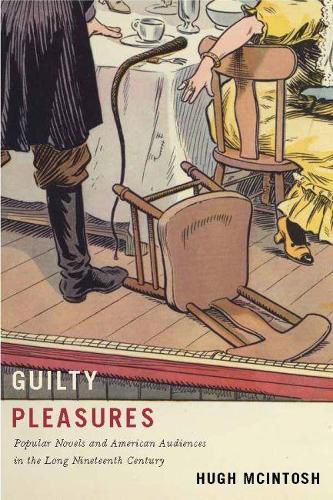Readings Newsletter
Become a Readings Member to make your shopping experience even easier.
Sign in or sign up for free!
You’re not far away from qualifying for FREE standard shipping within Australia
You’ve qualified for FREE standard shipping within Australia
The cart is loading…






This title is printed to order. This book may have been self-published. If so, we cannot guarantee the quality of the content. In the main most books will have gone through the editing process however some may not. We therefore suggest that you be aware of this before ordering this book. If in doubt check either the author or publisher’s details as we are unable to accept any returns unless they are faulty. Please contact us if you have any questions.
Guilty pleasures in one’s reading habits are nothing new. Late-nineteenth-century American literary culture even championed the idea that popular novels need not be great. Best-selling novels arrived in the public sphere as at once beloved and contested objects, an ambivalence that reflected and informed America’s cultural insecurity. This became a matter of nationhood as well as aesthetics: the amateurism of popular narratives resonated with the discourse of new nationhood.
In Guilty Pleasures, Hugh McIntosh examines reactions to best-selling fiction in the United States from 1850 to 1920, including reader response to such best-sellers as Uncle Tom’s Cabin, Ben Hur, and Trilby as well as fictional representations-from Trollope to Baldwin-of American culture’s lack of artistic greatness. Drawing on a transatlantic archive of contemporary criticism, urban display, parody, and advertising, Guilty Pleasures thoroughly documents how the conflicted attitude toward popular novels shaped these ephemeral modes of response. Paying close attention to this material history of novel reading, McIntosh reveals how popular fiction’s unique status as socially saturating and aesthetically questionable inspired public reflection on what it meant to belong to a flawed national community.
$9.00 standard shipping within Australia
FREE standard shipping within Australia for orders over $100.00
Express & International shipping calculated at checkout
This title is printed to order. This book may have been self-published. If so, we cannot guarantee the quality of the content. In the main most books will have gone through the editing process however some may not. We therefore suggest that you be aware of this before ordering this book. If in doubt check either the author or publisher’s details as we are unable to accept any returns unless they are faulty. Please contact us if you have any questions.
Guilty pleasures in one’s reading habits are nothing new. Late-nineteenth-century American literary culture even championed the idea that popular novels need not be great. Best-selling novels arrived in the public sphere as at once beloved and contested objects, an ambivalence that reflected and informed America’s cultural insecurity. This became a matter of nationhood as well as aesthetics: the amateurism of popular narratives resonated with the discourse of new nationhood.
In Guilty Pleasures, Hugh McIntosh examines reactions to best-selling fiction in the United States from 1850 to 1920, including reader response to such best-sellers as Uncle Tom’s Cabin, Ben Hur, and Trilby as well as fictional representations-from Trollope to Baldwin-of American culture’s lack of artistic greatness. Drawing on a transatlantic archive of contemporary criticism, urban display, parody, and advertising, Guilty Pleasures thoroughly documents how the conflicted attitude toward popular novels shaped these ephemeral modes of response. Paying close attention to this material history of novel reading, McIntosh reveals how popular fiction’s unique status as socially saturating and aesthetically questionable inspired public reflection on what it meant to belong to a flawed national community.